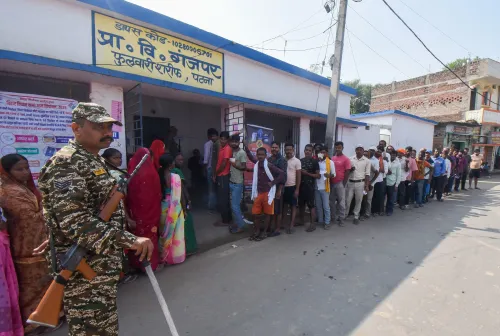Is Congress's ‘appeasement’ politics failing against terrorism?

Synopsis
Key Takeaways
- PM Modi's critique emphasizes the need for accountability in political responses to terrorism.
- The contrast between BJP and Congress governance highlights differing approaches to national security.
- Past instances of alleged appeasement politics are central to the current political discourse.
- The changing landscape of Indian politics reflects a shift in public sentiment towards security.
- PM Modi's message signals an end to tolerance for terrorism under the guise of political gain.
New Delhi, July 29 (NationPress) Prime Minister Narendra Modi launched a scathing attack on the Congress during his response to the debate on Operation Sindoor in the Lok Sabha on Tuesday, accusing the party of years of inaction against terrorism due to its “appeasement politics” and vote-bank compulsions.
In a fiery speech, PM Modi stated that prior to 2014, the nation was engulfed in fear, with constant terror alerts and citizens left to secure their own safety. “Previously, the government didn’t provide protection — it merely issued warnings. People were advised to remain vigilant, as bombs could explode anytime. That was the grim reality during Congress’s rule,” PM Modi remarked.
He contrasted the current administration’s tactics with those of the previous Congress-led regimes, asserting that under BJP governance, India has shown both the determination and ability to respond decisively to terrorism. “The nation is questioning today: if we can take strong actions against terror, why didn’t Congress governments do the same? What held them back?” PM Modi queried.
The Prime Minister alleged that Congress has been lenient towards terrorism to appease its vote banks, citing several instances to support his argument:
Batla House incident: “When terrorists were neutralized, a senior Congress figure was seen crying. This was not compassion for the victims — it was appeasement at its most disgraceful.”
Parliament attack (2001): “A Congress leader suggested that terrorist Afzal Guru deserved the benefit of the doubt, even after such an audacious attack on India’s democracy.”
26/11 Mumbai attacks: “Despite clear global evidence linking the attackers to Pakistan, Congress attempted to promote the narrative of ‘saffron terror’. Their priority was safeguarding their vote banks rather than protecting the nation.”
PM Modi also criticized Congress for diluting anti-terror laws and hindering the complete implementation of the Constitution in Jammu & Kashmir. “Why didn’t Article 370 get revoked sooner? Because Congress feared upsetting its appeasement strategy. The Constitution drafted by Dr. Ambedkar was kept out of Kashmir by Congress itself.”
He also mentioned a reported incident where a Congress leader allegedly stated to a US diplomat that Hindu organizations posed a greater threat than Lashkar-e-Taiba. “Consider this mindset,” PM Modi stated, “equating patriots with terrorists — merely for political advantage.”
The Prime Minister’s address, filled with pointed accusations and references to past terror incidents, highlighted the BJP’s assertive stance on national security and its efforts to challenge the Opposition — particularly Congress — on matters of internal safety and patriotism.
As the Lok Sabha remained in tense silence, disrupted by sharp protests from the Opposition, PM Modi concluded with a decisive message: “The landscape of our country has transformed. The politics of fear and appeasement will no longer be tolerated. The era of ignoring terrorism is finished.”









